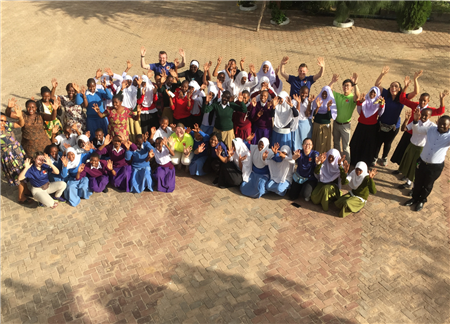
In honour of International Womxn's Day #IWD2021 we would like to highlight the Girls Leadership and Empowerment Program in Tanzania! Through the program, we #ChooseToChallenge gender inequality and take action for a gender-equal world!
The program provides leadership training for secondary school girls in Singida, Tanzania. The girls engage in activities designed to grow their confidence and self-esteem, help them in setting goals, and emphasize the importance of developing agency and achieving economic independence. They participate in STEM activities, learn about female health and wellness, and learn about their rights as children and girls. They leave feeling uplifted and aware that they are not inferior and deserve to be treated with dignity and respect.
This year we #ChooseToChallenge because girls continue to be marginalized and disadvantaged in all areas of society including education. There is a constant need to provide empowering opportunities for this vulnerable population that face numerous social and economic barriers. These barriers stem from social/cultural factors. Poverty remains a major deterrent to education, and lack of education is a major cause of poverty, creating a self-perpetuating cycle. Uneducated or undereducated girls become illiterate women and parents unable to support their children, and the cycle continues. When families face poverty, girls are the first to be taken out of school and put into very poor paying work in often dangerous conditions. The poverty issue operates side by side with cultural beliefs which prioritize boy’s education over that of girls (Ministry of Community Development, Women’s Welfare and Children, 1996). According to the United Nations Girls Education Initiative (UNGEI), the girl child is the first victim of household poverty and hunger because of favouring boys over girls in most African cultures (http://www.african initiatives.org.uk/projects/barriers.htm).
The grounds for such favouritism is that girls will get married to a different family which means the education to be obtained will not benefit the immediate family as it would if boys were educated (Rendell & Gergel, 2009). Such beliefs and other socioeconomic factors such as gender roles, mistrust, and personal preferences and the like jeopardize girls' education. They are the first to be denied or asked to voluntarily terminate their education in order to take care of sick parents and to look after the younger siblings when they become orphaned. There is a direct link between the lack of education in Tanzania and a host of challenges faced by girls including human trafficking, teenage pregnancy, and inter-generational poverty. Children that come from poor families are much more at risk of being trafficked. Girls who have received primary but not secondary education are most at risk. Girls from rural areas are trafficked into urban areas for domestic servitude (house girls) or prostitution. A fundamental and seemingly intractable problem is entrenched social and cultural attitudes in some communities where strong traditions are against the educating of girl children leading to their vulnerability.
“The participation of women in all spheres of society is fundamental to development and prosperity. Research shows that investing in women and girls is one of the most significant things that a society can do in this regard. Investments in education has to be the start. Educated women, have better incomes, have children later, have fewer children, have healthier children and live longer healthier lives. This is why initiatives like our Girls’ Leadership and Empowerment Program are so important and impactful when scaled up.” – Dr. Clinton Beckford, Project Director
Upon completion of the program, several of the girls from the program have gone on to higher education. This includes upper high school for students who are thought to be university-bound, college, and vocational training institutes. So far the program has successfully welcomed over a hundred girls to attend the program and over twenty female teachers!
The program has grown in popularity and impact since its inception. Between 2017-2019 at least 60 girls and 10 female teachers attended each year. There are 10 participating public schools which we intend to grow to 16 with more resources. Unfortunately, the COVID-19 pandemic caused the cancellation of the program in 2020. In 2021, we are developing resources and activities which will be sent to Tanzania for schools to use to engage girls. The resources are being created by teacher candidates in the Faculty of Education, University of Windsor’s Global Community Engagement Program and local teachers.
You're invited to learn more and donate to the program here